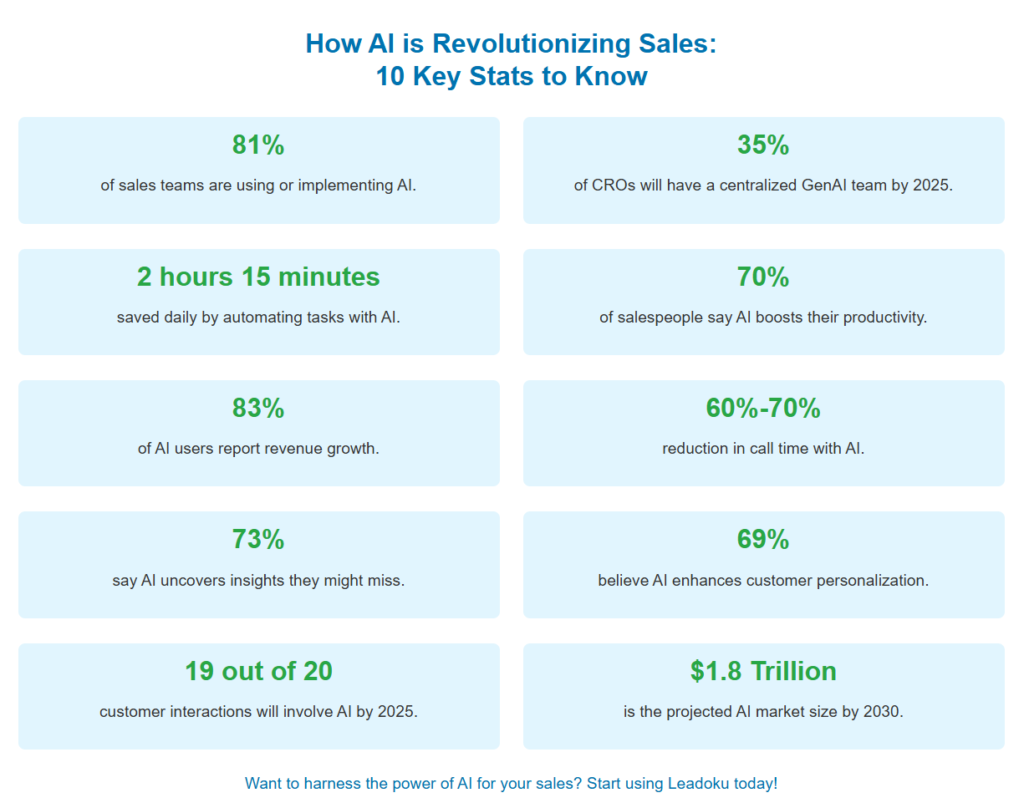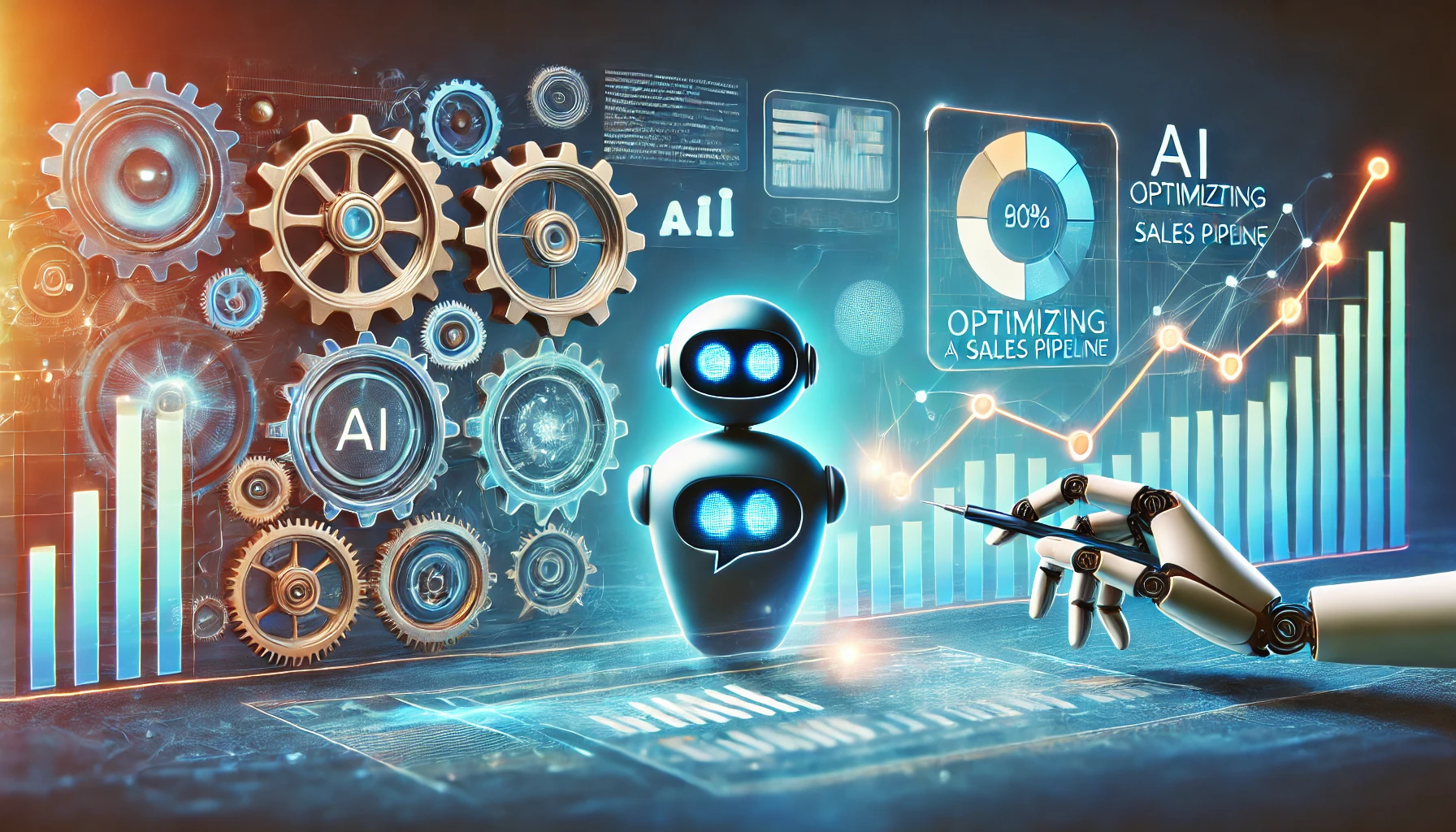In the modern business environment, AI in B2B sales outreach is no longer just a trend, but a game-changer. As companies do everything to connect with their target audiences more effectively, artificial intelligence offers innovative solutions. Nowadays, it’s quite difficult to imagine that you can streamline processes, enhance personalization, and ultimately drive sales success without AI – and stay competitive.
From automating routine tasks to providing previously unimaginable insights, AI is reshaping how businesses approach sales outreach. Let’s explore how to use AI in sales, and revolutionize your sales strategy.
Why AI Matters in B2B Sales Today
AI’s impact on B2B sales is quite profound. With the enormous volume of data generated daily, sales teams are overwhelmed trying to analyze them in a given period of time. By leveraging AI, businesses can significantly enhance their outreach efforts. Here are a few reasons why it is essential to use AI in sales – because it helps you:
- Increase Efficiency: AI automates repetitive tasks, allowing sales teams to concentrate on high-value activities.
- Enhance Accuracy: Through sales forecasting using AI, teams can make more informed decisions based on data-driven insights.
- Drive Engagement: AI enables businesses to create tailored outreach strategies that resonate with potential clients.

In essence, AI bridges the gap between data and actionable insights, making it an indispensable tool for any modern sales team.
Key Ways AI Is Transforming Sales Outreach
Automating Repetitive Tasks
One of the most significant advantages of AI is its ability to handle repetitive tasks. Tools like Leadoku’s LinkedIn Campaign Automation can manage everything from lead generation to follow-ups, and nurturing leads. This automation not only saves time, but to get new customers. Here is how to use AI for sales prospecting
AI tools can automate:
- Email outreach
- Meeting scheduling
- Response tracking
By automating these processes, sales teams can get in touch with a lot more people than before, while staying focused and keeping the tone. (modern AI tools let you personalize almost all activities)
Personalizing Customer Interactions at Scale
With AI, businesses can implement personalized AI-driven outreach. This way, you can address the unique needs of each prospect, and multiply the number of projects you contact at the same time! This level of personalization was previously unattainable at scale, but AI makes it possible.
Using advanced data analytics, AI tools analyze customer behavior and preferences, enabling tailored messaging that resonates with potential clients. This enhances the customer experience but also increases the likelihood of conversion.
Important stats related to AI in sales
Adoption and Implementation:
- 81% of sales teams are either experimenting with or have fully implemented AI in their operations. Salesforce
- By 2025, 35% of chief revenue officers are expected to establish a centralized “GenAI Operations” team within their go-to-market organization. Gartner
Productivity and Efficiency:
- Sales professionals save an average of 2 hours and 15 minutes per day by using AI for sales, to automate manual tasks. HubSpot Blog
- 70% of salespeople believe AI tools boost their work productivity. G2 Learning
Revenue Growth:
- 83% of sales teams utilizing AI have experienced revenue growth, compared to 66% of teams not using AI. Salesforce
- Companies using AI for sales have seen a 60% to 70% reduction in call time and a 50% increase in leads. G2
Data Insights and Personalization:
- 73% of sales professionals agree that AI helps them extract insights from data they might otherwise miss. HubSpot Blog
- 69% of sales professionals believe AI can enhance the personalization of the customer experience. HubSpot Blog
Future Outlook:
- By 2025, AI is projected to assist in 19 out of 20 customer interactions. G2 Learning
- The global AI market is expected to grow from approximately $200 billion in 2023 to over $1.8 trillion by 2030. Statista

Real-World Examples of AI in B2B Sales
The integration of AI in B2B sales is evident in various successful implementations. For instance:
- LinkedIn Sales Navigator: This tool uses AI algorithms to suggest leads based on user activity and preferences, making it easier to connect with potential customers.
- Salesforce Einstein: This AI feature analyzes sales data to provide predictive insights, helping teams prioritize leads and forecast sales more accurately.
These examples highlight practical AI use cases in sales that can significantly enhance the effectiveness of automized outreach.
The Challenges of Implementing AI in Sales
While the benefits of AI are compelling, there are challenges to consider:
- Cost: Implementing AI tools can require a significant investment, particularly for small businesses.
- Integration Issues: Ensuring that AI tools work seamlessly with existing systems can be complex.
- Data Privacy: Companies must navigate the regulatory landscape regarding customer data.
These challenges can be mitigated through careful planning and starting with smaller, pilot projects before scaling up.
The Future of AI in B2B Sales Outreach
As technology continues to evolve, the future of sales outreach using AI looks promising. Emerging trends include enhanced predictive analytics and greater personalization. Expect to see AI tools that offer deeper insights into customer behavior and preferences, allowing for even more tailored communication strategies.
How to Use AI in Sales For B2B
If you’re ready to embrace AI in your sales strategy, here are some actionable steps:
- Identify Your Needs: Assess your current sales process and pinpoint areas where AI could add value.
- Choose the Right Tools: Research AI sales outreach tools that align with your goals. Look for those with strong user reviews and proven track records.
- Pilot Program: Start with a small-scale implementation to test the waters and gather insights.
- Train Your Team: Ensure your sales team is trained on how to use AI tools effectively to maximize their potential.
By taking these steps, you can smoothly integrate AI into your sales processes and start reaping the benefits.
FAQs
How does AI improve B2B sales outreach?
AI enhances outreach by automating tasks, providing personalized insights, and improving lead quality through data analysis.
What are the best AI tools for sales teams?
Some top tools include LinkedIn Sales Navigator and Salesforce Einstein, as well as automation tools like Leadoku for LinkedIn outreach.
Is AI cost-effective for small businesses?
While initial costs can be high, the efficiency and increased sales potential often justify the investment.
What are the risks of using AI in sales?
Risks include data privacy concerns and potential reliance on technology over personal interaction.
How do I integrate AI into my existing sales process?
Start small with pilot programs, choose relevant tools, and train your team to adapt to new technologies.
By leveraging the power of AI in your B2B sales outreach, you can not only enhance efficiency but also build stronger relationships with your prospects, ultimately driving higher conversions and long-term success.

